- News
- Reviews
- Bikes
- Accessories
- Accessories - misc
- Computer mounts
- Bags
- Bar ends
- Bike bags & cases
- Bottle cages
- Bottles
- Cameras
- Car racks
- Child seats
- Computers
- Glasses
- GPS units
- Helmets
- Lights - front
- Lights - rear
- Lights - sets
- Locks
- Mirrors
- Mudguards
- Racks
- Pumps & CO2 inflators
- Puncture kits
- Reflectives
- Smart watches
- Stands and racks
- Trailers
- Clothing
- Components
- Bar tape & grips
- Bottom brackets
- Brake & gear cables
- Brake & STI levers
- Brake pads & spares
- Brakes
- Cassettes & freewheels
- Chains
- Chainsets & chainrings
- Derailleurs - front
- Derailleurs - rear
- Forks
- Gear levers & shifters
- Groupsets
- Handlebars & extensions
- Headsets
- Hubs
- Inner tubes
- Pedals
- Quick releases & skewers
- Saddles
- Seatposts
- Stems
- Wheels
- Tyres
- Health, fitness and nutrition
- Tools and workshop
- Miscellaneous
- Tubeless valves
- Buyers Guides
- Features
- Forum
- Recommends
- Podcast
review
£949.00
VERDICT:
Solid road bike with an efficient geometry and a good component package; put it on your shortlist if you have a £1,000 budget
Weight:
9,700g
Contact:
www.scott-sports.com
At road.cc every product is thoroughly tested for as long as it takes to get a proper insight into how well it works. Our reviewers are experienced cyclists that we trust to be objective. While we strive to ensure that opinions expressed are backed up by facts, reviews are by their nature an informed opinion, not a definitive verdict. We don't intentionally try to break anything (except locks) but we do try to look for weak points in any design. The overall score is not just an average of the other scores: it reflects both a product's function and value – with value determined by how a product compares with items of similar spec, quality, and price.
What the road.cc scores meanGood scores are more common than bad, because fortunately good products are more common than bad.
- Exceptional
- Excellent
- Very Good
- Good
- Quite good
- Average
- Not so good
- Poor
- Bad
- Appalling
The Scott Speedster S30 is an efficient road bike that you should definitely consider if you're after a sub-£1,000 setup.
The price band just below £1,000 is a competitive one. The manufacturers know a lot of people can justify spending £900-and-something on a bike but over £1,000? It's a psychological hurdle, a step too far.
The £1,000 mark is also important because Bike to Work schemes max out at a grand. If a bike is priced at £1,001, it's not an option for a large proportion of the bike-buying public, so manufacturers set their RRPs accordingly.
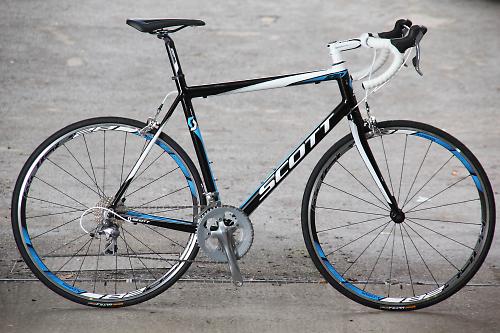
All this means that you can get a lot of bike just below £1,000, the S30 being a case in point. I've had a lot of fun on this bike over the past few weeks... and that's from a bloke who's lucky enough to spend a lot of time on machines that are considerably more expensive (it's my job; and a very tough one it is too). There's plenty to like here. Here are my top three things about the S50...
1 Solid and efficient frame
The frame is made from 6061 double-butted alloy and it's neatly put together. It's not a feature-packed frame with loads of shaping here, there and everywhere, but that's not a bad thing. The tube profiles are mostly – wait for it – round. Crazy! It'll never catch on. And the seatstays are – wait for it – straight.

The welds are tidy enough and the paintjob is good, and you get little pip on the right-hand stay for hanging your chain on when you take the rear wheel out, saving the chainstay from scuffing. You also get an eyelet above each of the rear dropouts for fitting a mudguard or rack.
Out on the road, there's little apparent flex in the frame even when you sprint for road signs against your ride-mates. It's the same story with the carbon leg, alloy steerer fork that does its job commendably well.
2 Plenty of comfort
I found this bike comfortable too. The ride position is a little more upright than I'm used to, but really just a touch. The S30s top tube is a smidge shorter than Scott use for their high-end road bikes, but there's not much in it. We have the XL/58cm model on test and that comes with a 575mm top tube compared to 580mm on a racy Foil.
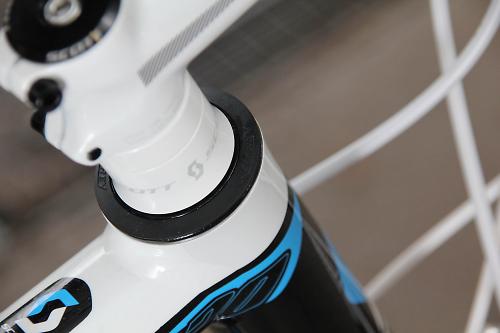
The S30's head tube is a touch longer but, again, there's not all that much in it: 190mm against the 180mm you get on a Foil. With the headset spacers taken out, I could sort out a low ride position – which is what I like. So, although Scott have made the setup a little less extreme than on their pure race bikes, they've not turned the S30 into a sit-up-and-beg leisure bike. You still ride in a quick, efficient position.
I got on well with Scott's own Road Team saddle too. Own-brand saddles, which you usually find on bikes at this price, can be a bit hit and miss. Actually, saddles in general can be a bit hit and miss; what suits one rider perfectly can be hell on rails for someone else. This saddle has fairly deep cushioning, which I'm not generally into, but the slim profile and just-right amount of flex in the shell are great... for me, at least.

I like the anatomic bend on Scott's alloy Pilot Pro handlebar too. I find a traditional curve a bit tight but the straightened out section behind the brake levers here is bang on. The generous amount of rearward sweep is welcome too; it means getting down on the drops feels less of a stretch.
I've got in a whole lot of miles on this bike during testing, including several long days in the saddle, and I've felt comfy throughout. Comfort has certainly never been a limiting factor here ... and that means you can just get on with enjoying the ride.
3 New Tiagra: it's good
Survey the market and you'll see that most road bikes priced just below the £1,000 mark come with a Shimano Tiagra-based spec and some own-brand components thrown in to keep the price down. The S30 is fairly typical in having shifters, mechs and chainset from the Tiagra range with own-brand brakes, and no-name hubs matched up to Alex rims.
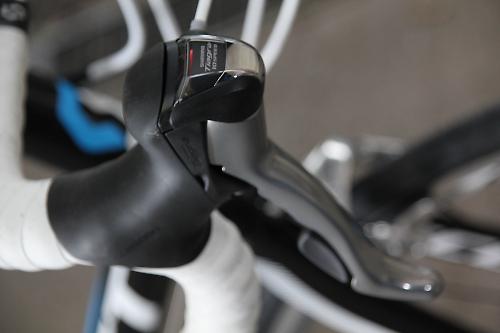
Tiagra is Shimano's fourth groupset tier (after Dura-Ace, Ultegra and 105; I'm not counting the Di2 electronic stuff here) and it has had a major redesign for 2012. The big change is that Tiagra has moved from 9-speed to 10-speed to bring it in line with the higher-level groups (for the time being, until Dura-Ace goes 11-speed).
The shape of the Tiagra shifters has been altered to mirror that of the more expensive options too, and they're reach-adjustable for smaller hands via shims. Unlike those other Shimano options, the gear cables run externally rather than underneath the bar tape but that was the case right up to Dura-Ace just a few years ago.

Scott don't include barrel adjusters up by the shifters to allow you to fine-tune cable tension on the fly, and there are no adjusters at the head tube cable stops either. That means that if your gears go slightly out of sync you have to stop and fiddle with the barrel adjuster on the rear mech... although, once set properly, they tend to behave themselves.
The Tiagra chainset is a compact – it has slightly smaller than standard 50-tooth and 34-tooth chainrings – and you get a wide-ranging 12-30T cassette at the back. That 30T sprocket is a whopper that'll take the pain out of most hills, even if you're not a particularly strong climber. You might not get to the top very fast in such a small ratio, but chances are that you will get there in the end.
The overall impression of new Tiagra is that it's solid and reliable with an up-market feel. It's a little heavier than Shimano's top groupsets but in terms of performance it's not a million miles behind them. I'm not sure I'm down with the little optical display in the shifter that tells you what gear you're in – some people like it, some people don't – but taken as a whole it's great stuff and extremely good value.
Where are the compromises?
Every bike has compromises, especially if a manufacturer is working hard to make a price point. The S30, like many other sub-£1,000 bikes, comes fitted with Scott's own-brand brake callipers, for example, rather than sticking with the Tiagra theme.
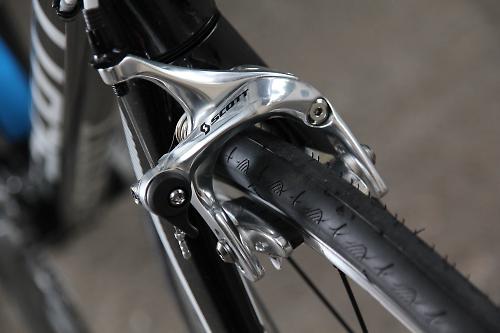
Scott's new Pro SCBR-525 dual pivot callipers are actually surprisingly good, providing a pretty strong bite. When you have to stop in a hurry, the limiting factor is usually the amount of grip the Continental Ultra Sport tyres have on the road rather than the amount of power provided by the brakes... or, at least, it is when the Tarmac is just the slightest bit damp. I didn't find myself wanting more oomph on the descents.
The wheels are another common budget-making compromise on bikes at this price. Some brands spec Shimano's cheaper options, Trek use wheels from their own Bontrager range while Scott, in common with lots of other manufacturers, go for no-name hubs and Alex rims.
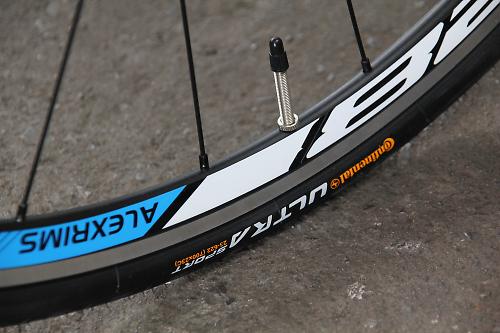
They're not particularly great wheels but they're fine. The loose bearing hubs have spun smoothly throughout the test period, but you'd expect that. Despite seeing plenty of action, both wheels have stayed pretty straight too – not perfect, but not far off. I've not had to take a spoke key to either.
They're fairly heavy, though, the Race28 alloy rims – which are actually 27mm deep – adding quite a bit of rotational weight. The wire-beaded Conti Ultra Sport tyres aren't light either. That said, there's enough tread here that they should last well. And, although these don't boast any particular puncture-prevention features, I've had no flats with these. Of course, I might just have been lucky.
You notice that weight most on the climbs where the wheels lack any great sense of urgency. They do the job but they're not a particular highlight.
Overall
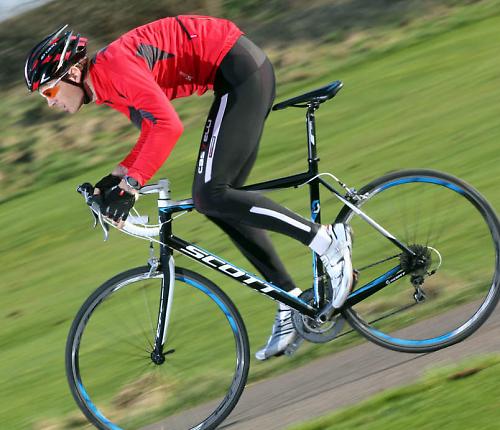
This is a very good bike for the money and I enjoyed it immensely. Obviously, this bike isn't as light as something twice as expensive which means that winding up the speed takes a little longer, but it's an okay weight and it certainly feels like a proper road bike.
What do I mean by that? I guess the main things are that Scott have stuck with an efficient geometry and the Tiagra components function a lot like Shimano's high-end kit. If I was spending £1,000 on a road bike, this one would certainly be on my shortlist.
Verdict
Solid road bike with an efficient geometry and a good component package; put it on your shortlist if you have a £1,000 budget
road.cc test report
Make and model: Scott Speedster S30
Size tested: XL/58cm
About the bike
State the frame and fork material and method of construction. List the components used to build up the bike.
* FRAME Double.butted 6061 alloy tubing
* FORK Speedster Carbon/Alloy, 1 1/8', Alloy steerer
* HEADSET Integrated Steel Cup
* REAR MECH Shimano Tiagra,
* FRONT MECH Shimano Tiagra
* SHIFTERS Shimano Tiagra,
* BRAKES Scott Pro SCBR-525 new, cartridge pads
* CHAINSET Shimano Tiagra, compact
* BOTTOM BRACKET Shimano Tiagra
* HANDLEBAR Scott Road Pilot Pro OS, anatomic 31.8 mm
* STEM Scott Road Pilot Pro OS, 1 1/8in, four Bolt 31.8 mm
* SEATPOST Scott Alloy, 31.6/300 mm
* SADDLE Scott Road Team
* HUBS Scott Comp 20H
* CHAIN Shimano Tiagra,
* CASSETTE Shimano Tiagra, 10-speed, 12-30-tooth
* SPOKES CN - Standard, Black, 2mm 20 front, 24 rear
* RIMS Alex Race 28 Aero Profile,
* TYRES Continental Ultra Sport, 700 x 23C
Tell us what the bike is for, and who it's aimed at. What do the manufacturers say about it? How does that compare to your own feelings about the bike?
Scott say, "The Speedster bikes are economical, lightweight and efficient. The shape optimized double-butted alloy tubing and proven geometry provide comfort and great handling. The Speedster line features replaceable derailleur hangers and durable components to ensure long life and excellent value."
It's an alloy road bike for all kinds of roadie action: sports/fitness rides, sportives, long commutes... going quick on the road, basically.
Frame and fork
Overall rating for frame and fork
7/10
Tell us about the build quality and finish of the frame and fork?
The welds are neat and tidy, the paint job is good... nothing to worry about there.
Tell us about the materials used in the frame and fork?
The frame is 6061 alloys that's double butted to save weight. The fork comes with carbon legs and an alloy steerer – that's nearly always the case on road bikes of this price.
Tell us about the geometry of the frame and fork?
It's a fairly traditional road bike geometry with a slightly more upright ride position than Scott's full-on race bikes.
How was the bike in terms of height and reach? How did it compare to other bikes of the same stated size?
The ride position of the Speedsters is the same as that of Scott's carbon CR1 bikes and slightly shorter and slightly higher than that of the Foil race bikes. Scott haven't ditched efficiency though - this is still an efficient ride position.
Riding the bike
Was the bike comfortable to ride? Tell us how you felt about the ride quality.
I found it comfortable, partly because I liked the ride position, partly because I got on well with the saddle and shifter hoods, and partly because I didn't feel very much road buzz.
Did the bike feel stiff in the right places? Did any part of the bike feel too stiff or too flexible?
Fine on that score.
How did the bike transfer power? Did it feel efficient?
Yes, efficient - I didn't notice any particular flex at either end.
Was there any toe-clip overlap with the front wheel? If so, was it a problem?
Not on this 58cm model.
How would you describe the steering? Was it lively, neutral or unresponsive? Fairly normal for a road bike of this kind.
Rate the bike for efficiency of power transfer:
8/10
Rate the bike for acceleration:
7/10
It's not as light as many bikes and that dulls the acceleration a bit. Fitting lighter wheels would certainly add more speed off the mark.
Rate the bike for sprinting:
7/10
Rate the bike for high speed stability:
8/10
Rate the bike for cruising speed stability:
8/10
Rate the bike for low speed stability:
8/10
Rate the bike for flat cornering:
7/10
Rate the bike for cornering on descents:
7/10
Rate the bike for climbing:
7/10
The drivetrain
Rate the drivetrain for performance:
8/10
Rate the drivetrain for durability:
8/10
Rate the drivetrain for weight:
8/10
Rate the drivetrain for value:
9/10
Tell us some more about the drivetrain. Anything you particularly did or didn't like? Any components which didn't work well together?
New Tiagra is great stuff: solid, reliable, slick. Top performance for the cash.
Wheels and tyres
Rate the wheels and tyres for performance:
7/10
Rate the wheels and tyres for durability:
8/10
They're pretty much straight and true still, and the bearings are going well.
Rate the wheels and tyres for weight:
7/10
Rate the wheels and tyres for comfort:
8/10
Rate the wheels and tyres for value:
7/10
Controls
Rate the controls for performance:
8/10
Rate the controls for durability:
8/10
Rate the controls for weight:
8/10
Rate the controls for comfort:
8/10
Rate the controls for value:
9/10
Your summary
Did you enjoy riding the bike? Yes
Would you consider buying the bike? It would be on my shortlist at this price
Would you recommend the bike to a friend? As above
Rate the bike overall for performance:
8/10
Rate the bike overall for value:
8/10
About the tester
Age: 41 Height: 190cm Weight: 75kg
I usually ride: My best bike is:
I've been riding for: Over 20 years I ride: Most days I would class myself as: Expert
I regularly do the following types of riding: time trialling, commuting, club rides, sportives, general fitness riding,
Mat has been in cycling media since 1996, on titles including BikeRadar, Total Bike, Total Mountain Bike, What Mountain Bike and Mountain Biking UK, and he has been editor of 220 Triathlon and Cycling Plus. Mat has been road.cc technical editor for over a decade, testing bikes, fettling the latest kit, and trying out the most up-to-the-minute clothing. He has won his category in Ironman UK 70.3 and finished on the podium in both marathons he has run. Mat is a Cambridge graduate who did a post-grad in magazine journalism, and he is a winner of the Cycling Media Award for Specialist Online Writer. Now over 50, he's riding road and gravel bikes most days for fun and fitness rather than training for competitions.























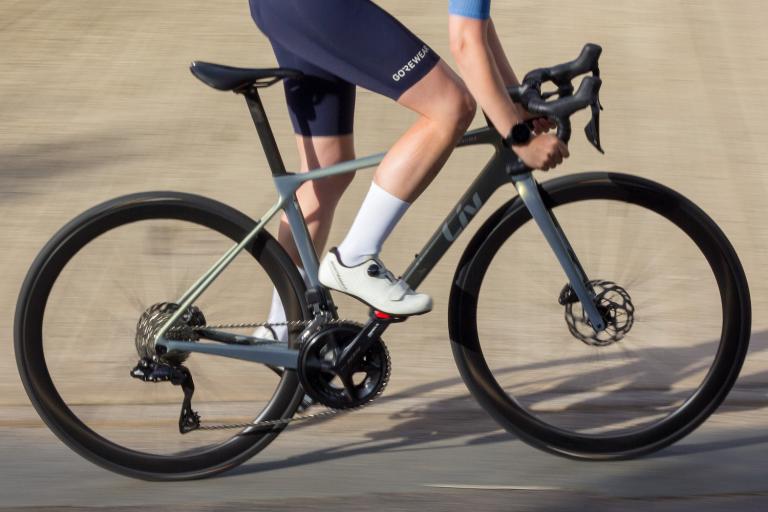
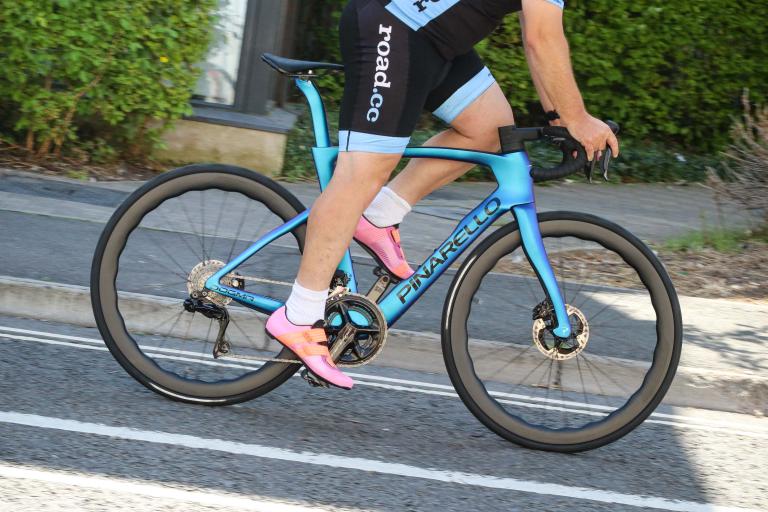
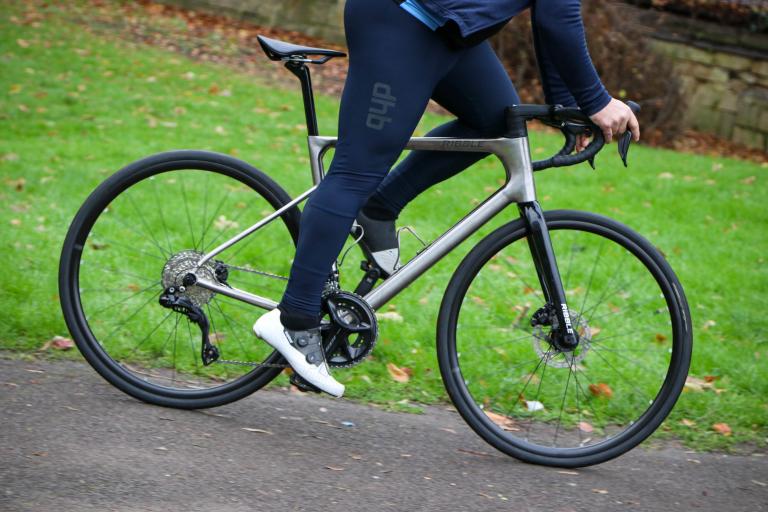
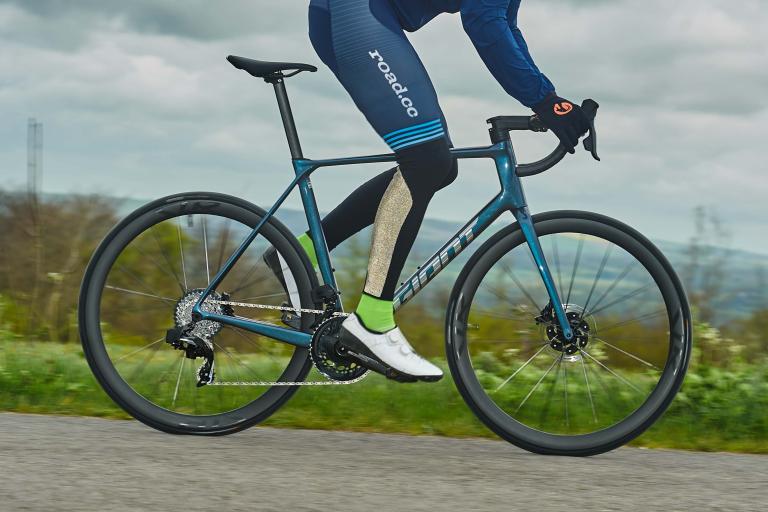
The headline in the rabidly anti cycling guardian was similar.
I'm thinking of the Brazil Olympics. Tre Whyte had financial backing to ride for the UK and didn't need BC to support him. He'd ridden in the...
Even if these bib tights are the best in the world who can afford them?
That kind of mistake is weasely made
Tediously, I never seem to get anywhere.
Has anyone bought wheels from Light Bicycle? If so what has your experience been?
Don't forget sudden concern about people with visual impairments and disabilities - whenever a cycle path is mooted.......
For the Oxford Mail, it's somewhat surprising that the headline wasn't "How can we get rid of cyclists?" in the first place.
I've just taken to shouting (as has my 6 year old cycling next to me) that people need to turn their lights down. The worst is the strobes on dark...
The problem is a political one rather than technical. The London Borough of Hammersmith & Fulham, Transport for London, and the Department...